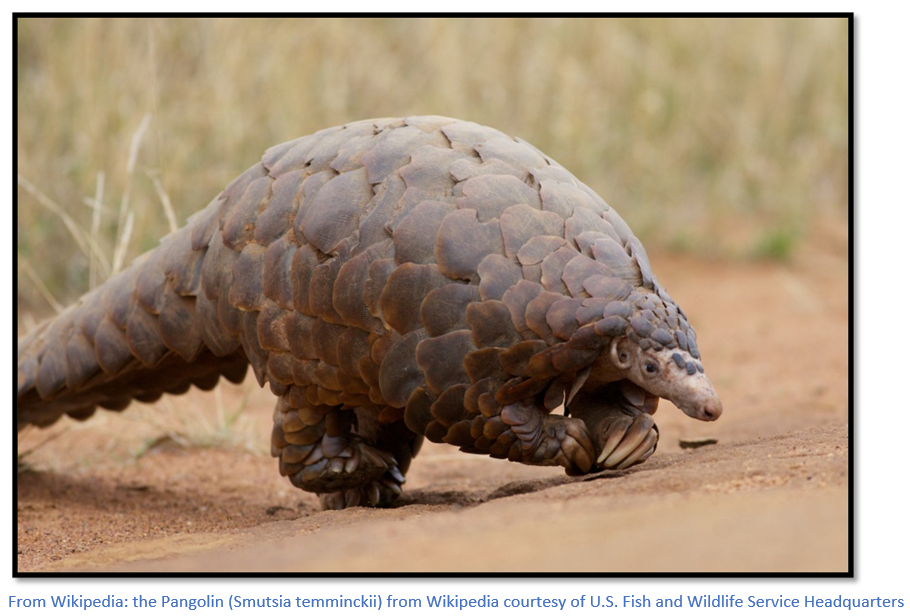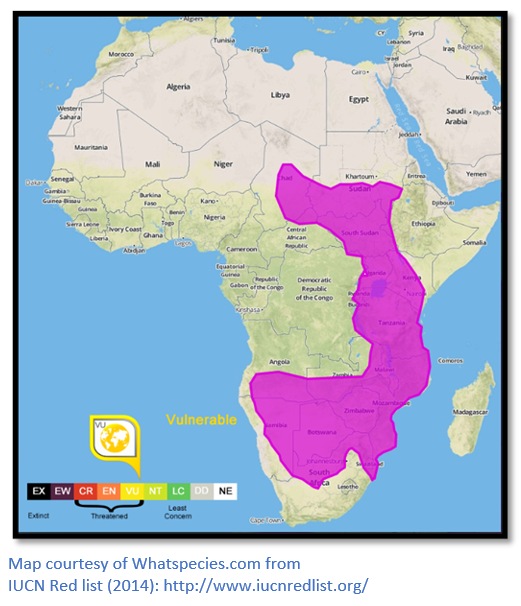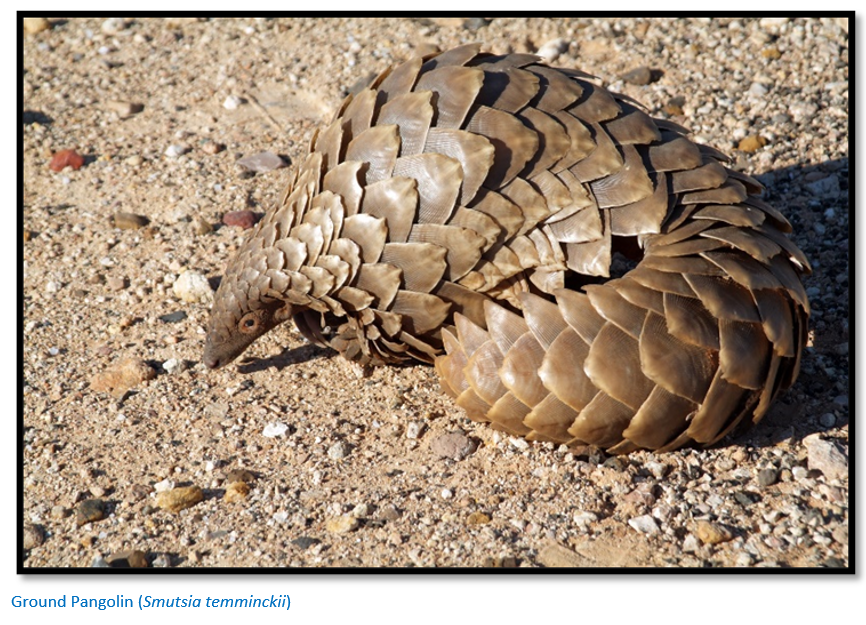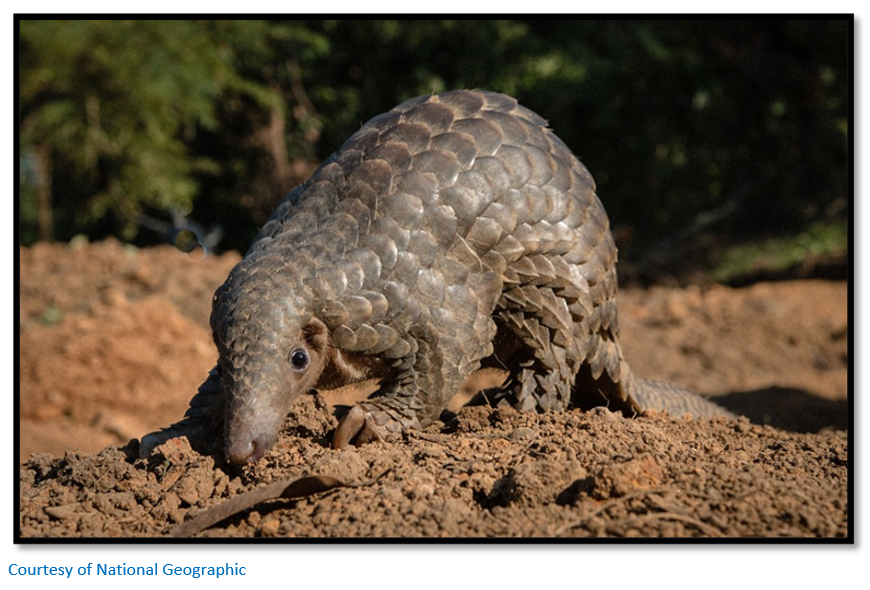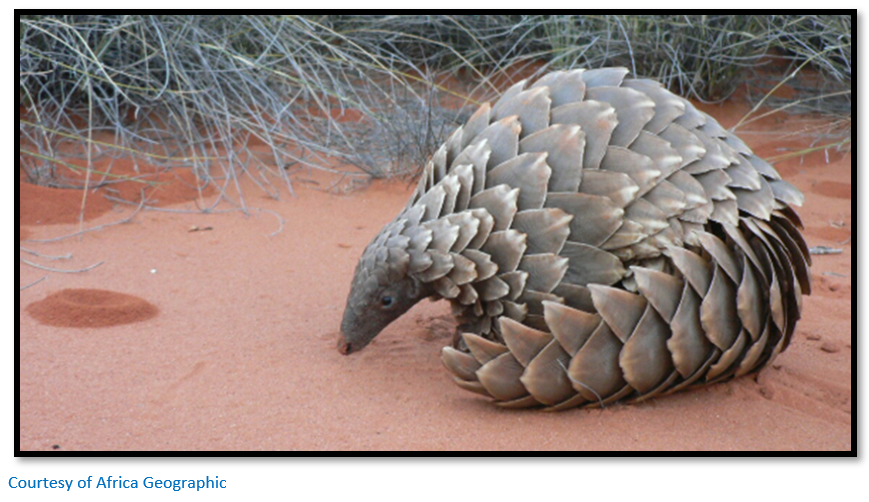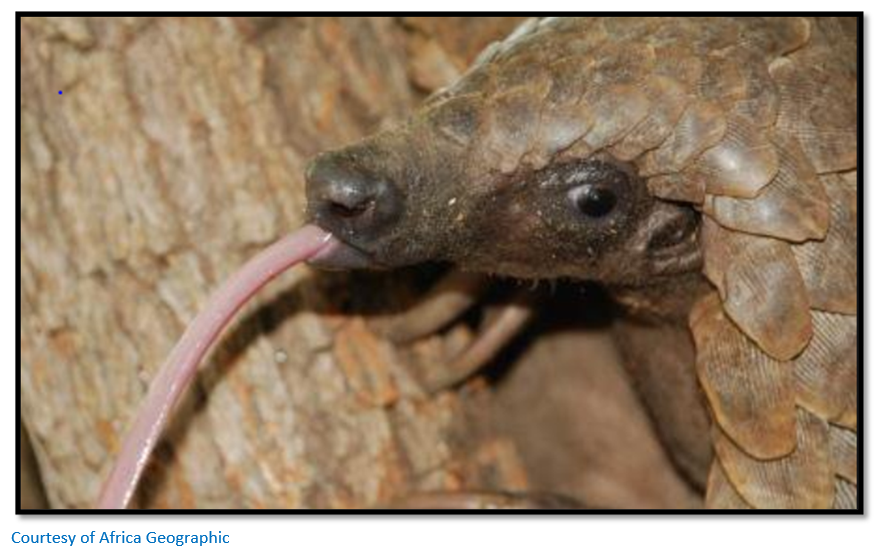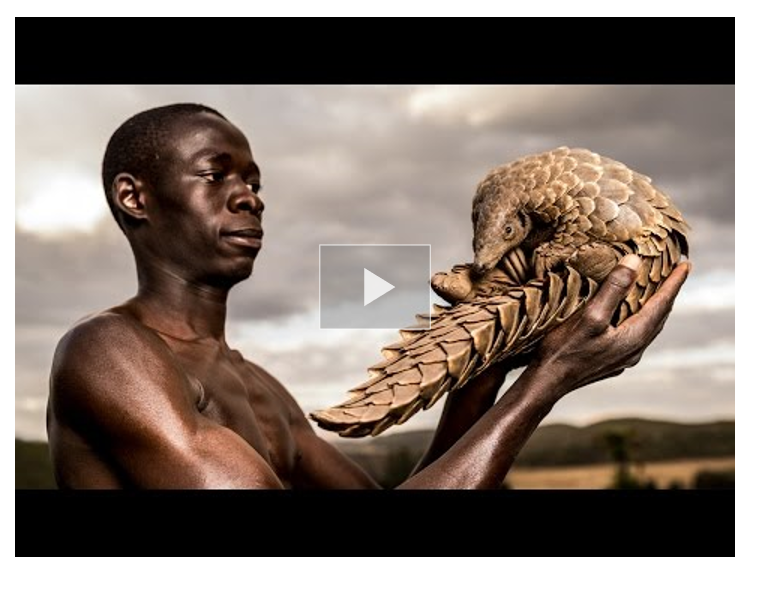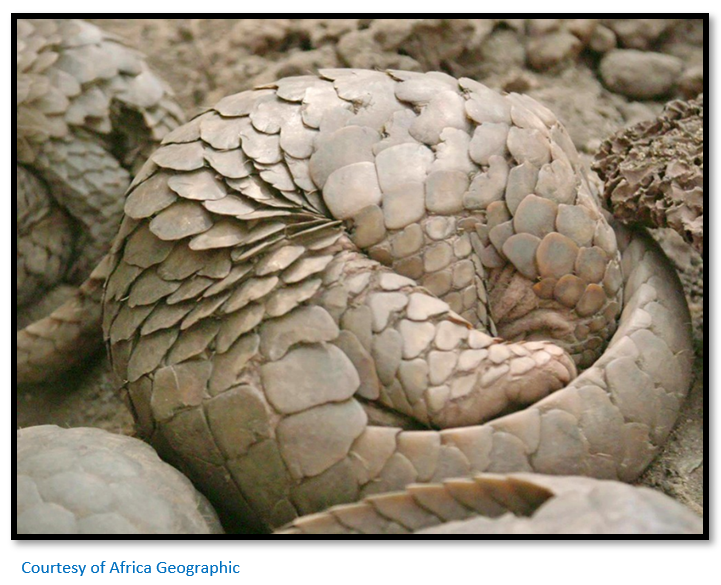Saving the Pangolin from the Wildlife trade where they are being increasingly trafficked
Pangolins are the most endangered mammal that you have never heard of.
There are eight species of pangolin; four in Asia and four in Africa and this article concentrates on the Ground Pangolin (Smutsia temminckii) that are found in Southern and Eastern Africa as shown in the distribution map below.
However you may have heard them described as “scaly anteaters” because…yes, you guessed it, their favourite snacking food is ants and termites, although they also enjoy larvae and other small insects. They don’t have teeth, instead they have a long sticky tongue up to 40 cms (16 inches) which their insect food gets stuck on before being swallowed whole because they don’t chew either!
These cute and gentle animals live solitary lives and being nocturnal feed largely at night…in fact they’re so inconspicuous that most of us have never seen a Ground pangolin. Kruger National Park, about the same size as Wales has had only seventy-three reported sightings in the last twenty years.
Their name pangolin comes from a Malay word “pengguling” which translated means “roller” - and indeed, they do roll into a ball when they feel threatened. In that sense their defensive tactics resemble those of the hedgehog and armadillo.
The pangolin is the only mammal that has scales that in the natural world protect it from other predators. Unfortunately the scales and rolling up in a tight ball are not an effective defence against humans.
What is the biggest threat to Pangolins?
Put simply, their biggest threat is mankind…yes, us. They are being hunted and cruelly killed so that their scales can be harvested and sold on the illegal wildlife market for use in traditional Chinese medicine, also increasingly as jewellery and their meat is eaten by an elite in China and Vietnam who consider it has health or sexual benefits.
As many as 200,000 pangolins are consumed each year in Asia for their scales and meat and more than 130 tonnes of scales, live and dead animals were seized in cross-border trafficking busts last year, according to conservation group WildAid.[i] As the pangolin in the Far East get more scarce, the pressure on Africa’s pangolins increases.
Are Pangolin’s on the road to extinction?
Simply put…yes! All eight species are on the ICUN (International Union for Conservation of Nature) Red List of Threatened Species along with rhinos and tigers. It is believed that over the past ten years over a million pangolins have been poached world-wide, many more than any other endangered mammal species. They are the most trafficked mammals in the world that you never heard of.
“All eight pangolin species are now listed as threatened with extinction, largely because they are being illegally traded to China and Vietnam” says Professor Jonathan Baillie, Co-Chair of the IUCN SSC Pangolin Specialist Group and Conservation Programmes Director at ZSL. “In the 21st Century we really should not be eating species to extinction – there is simply no excuse for allowing this illegal trade to continue.”
Nigeria has become a major hub for the trade from Africa; almost 34 tonnes of pangolin scales from Nigeria were intercepted in Hong Kong and Singapore in 2019 alone and as a consequence their own pangolins have become almost extinct.[ii]
Why are their scales so much in demand?
The short answer is…your guess is as good as mine. Their scales are made from keratin, the same protein that makes up rhino horn and our own hair and nails. Their scales act like a suit of armour and cover the whole body except the head and underside which are protected when the pangolin rolls itself up and the scales make up roughly twenty percent of its’ body weight. Anyone who believes in the twenty-first century that a sixteenth century text by a Chinese naturalist Li Shezhen[iii] who stated that pangolin scale is a valuable medical treatment needs to have their head carefully examined!
What is the size of this inhumane global trade in pangolin meat and scales?
The illegal wildlife trade is estimated to be worth from $7 -$19 billion per year.[iv] It has been ranked as the fourth most lucrative global illegal activity behind narcotics, counterfeiting and human trafficking.[v] Pangolins in Nigeria when they were plentiful fetched about $7 for a whole animal but in China or Vietnam can fetch $250.
Have pangolins been connected to the ongoing Covid-19 outbreak?
Pangolins have been in the spotlight since the start of the Covid-19 outbreak due to studies suggesting they may have been the intermediate host that transmitted the virus to humans. Two animals are known to naturally carry the Sars-CoV-2 virus – bats and pangolins, with the latter being the most problematic, both for its meat and for the scales that protect its body. Neither has been positively identified as the intermediate source that transferred the virus to humans, though a 100% identification may prove elusive, according to experts.
Since 1 January 2020 when the Chinese authorities shut down the Wuhan wet market where the virus was suspected to have originated, no official details have been released about the specific wildlife found there. What is known is that out of the 33 samples taken by investigators from the market that tested positive for the Sars-CoV-2 virus, 31 were from the area where wildlife was being sold.[vi]
Internationally there needs to be:
- Strong enforcement of national and international laws
- Removal of pangolins from the Pharmacopoeia of the People’s Republic of China – the traditional medicine handbook for the industry
- Investment in and promotion of herbal and synthetic alternatives
- Combined and coordinated efforts by governments, NGOs and the traditional Asian medicine community to eliminate consumer demand for pangolin-based traditional Asian medicines, particularly in China and Vietnam
Locally there needs to be:
- Support for alternative livelihoods, alleviation of poverty and education programmes within rural communities wherever pangolins are found to stop the slaughter. The IUCN SSC for example has launched a conservation action plan called “Scaling up Pangolin Conservation” that tries to educate local communities to move away from poaching and to strengthen legal legislation locally
- Better support for local wildlife Trusts, such as the Tikki Heywood Foundation in Zimbabwe which seeks to protect and rehabilitate pangolins that have been poached and re-introduces them back into the wild
- Tougher sentencing guidelines in local courts for wildlife trafficking crimes. Both Zimbabwe and Malawi need to be congratulated for introducing tougher sentencing guidelines for wildlife crimes in their Magistrates Courts.
Any tangible results in Southern Africa?
In Malawi the Environmental Investigation Agency reported that nine members of one of Southern Africa’s most prolific wildlife trafficking gangs were sentenced on 20 July 2020 by a Malawi court to a total of 56 years’ prison time. The nine convicted were members of the fourteen member Lin-Zhang syndicate and each was found guilty of at least one wildlife trafficking offence of a listed or protected species – pangolins, rhino horn, ivory or hippo teeth. The gang consisted of two Malawians and twelve Chinese nationals who will be deported immediately after serving their sentences.
Among them was Mrs Quinhua Zhang, the wife of Yunhua Lin, the alleged kingpin of the syndicate, who were each sentenced to eleven years jail for possession of rhino horn, an illegal firearm, conspiracy and money-laundering.
Brighton Kumchedwa the director of Malawi’s National Parks & Wildlife Agency said to Voice of America News: “We are looking at a foreign syndicate terrorizing southern Africa and Malawi included and now those culprits have been given 11 years, they are already serving another six years which means they will be behind bars for 17 years. I am sure the cartel now is being dismantled of these criminals.”
The UK’s Environmental Investigation Agency, which campaigns against environmental crimes and abuse, welcomed the sentencing with its executive director, Mary Rice, telling VOA that the ruling shows Malawi has demonstrated that it’s possible to get rid of such syndicates within one’s own borders. “In this particular case, it has been a very hard road. The syndicate was very well connected and did try every which way to get away from the rule of law, but there was tenacity and clear leadership which demonstrate that you can actually identify and prosecute these individuals.”
Are wildlife trafficking cases being as diligently pursued in Zimbabwe?
Zimbabwe to its great credit does have amongst the strictest laws against pangolin poaching in Africa. The animals are specially protected under the country’s Parks and Wildlife Act and illegally possessing or dealing in them attracts a prison sentence of up to 12 years, according to Zimbabwe’s Parks and Wildlife Authority. In 2015, authorities arrested 84 pangolin poachers in Zimbabwe and sentenced 47 to nine years in prison, the mandatory minimum sentence, according to the Tikki Hywood Foundation. The next year the number of poachers arrested shot up to 114; 52 received nine-year sentences.
Zimbabwe - the pangolin in Shona Society
Mongabay, a news conservation website, has an excellent article by Andrew Mambondiyani with an interview with Christopher Zimunya, the 72-year-old leader of the indigenous VaJindwi people in eastern Zimbabwe who tells him that “Pangolins are sacred here and we guard them jealously. These animals are really beautiful and finding one brings a lot of good luck to the person who finds it and it’s a taboo to kill it.”
Trevor Saruwaka, the MP for Zimbabwe’s Mutasa South constituency told Mongabay that many people were unaware of the gravity of pangolin poaching and the severe minimum nine year sentence it carried. He believes that local chiefs are using traditional beliefs about pangolins to try to fill that educational gap and deter poaching.[vii]
The article by Andrew Mambondiyani explains that pangolins fit into the local Shona belief system, both in Zimunya and elsewhere in Zimbabwe. “They are known in the local Jindwi dialect as harakabvuka and are known to be extremely rare, shy and mostly nocturnal. Many people in this region have never seen a pangolin, heightening the mythical quality of this reclusive animal. In fact, they use the word harakabvuka to refer to something very rare.”
The article continues: “If a person finds a pangolin walking by, it means a lot of good luck. And the number of steps the pangolin takes before it disappears means the number of good years that person is going to live,” Zimunya said. Conversely, harming a pangolin is thought to bring bad luck. “Here we don’t fathom or imagine a person killing a pangolin, worse still selling it. It’s a taboo,” he said.
Years back, Zimunya said, when a person found a pangolin, he or she was required to hand it over to the chief, who would then release it back into the forest. “Our forefathers protected these animals; no wonder we still have them today and we must do likewise.”
Under customary law if a person is caught killing or selling a pangolin, the chief would fine the poacher a cow and a goat — a heavy fine by rural standards— and turn him or her over to the national police. “To us a pangolin is more than just an animal; it is part of our culture. We teach our children to value the pangolin and never to kill or sell it,” Zimunya said. “We still have many pangolins living in all these mountains surrounding us but they are rarely seen and we pray they should be left where they are.”
The article concluded that traditional authorities such as Chiefs and Headmen can make a positive contribution in promoting traditional beliefs that protect pangolins.
Pangolins in Zimbabwe are being targeted by foreign wildlife syndicates
The K4D article by W.R. Avis states that traditionally there has always been loose connections between illicit hunters, corrupt officials and a much more powerful organised crime network and that in Africa there is an increasing concern that such networks might be working with militias and terrorist networks which target wildlife to generate funding.[viii]
The logistics of wildlife trafficking are often complex across Africa, but there are commonly three distinct phases - poaching, trafficking, and retail. The results of prosecutions show that each of these phases is becoming increasingly professionalised and dominated by criminal networks that often have Chinese individuals at their apex. These criminal syndicates move the poached or illicitly harvested wildlife with the help of the same techniques and networks used for illicit trafficking in persons, weapons, drugs, etc.[ix]
In Zimbabwe in the field of organised wildlife trafficking the ‘kingpins’ behind these criminal gangs are invariably corrupt ‘high-ups’ within ZANU-PF or National Parks, Police or Customs officials with almost invariably a Chinese connection. Those corrupted officials in a country whose economy is in freefall will usually facilitate the movement of illegal wildlife items such as pangolins or rhino horn out of the country and where an individual is apprehended at the crime scene they ensure the matter goes no further up the chain.
That few Chinese individuals have been accused of any wildlife crimes in Zimbabwe indicates the extent of the protection being given to these ‘kingpins’ who are busy organising the wildlife criminality behind the scenes. In most cases it appears that the tribesman is caught with ‘blood on their hands’ at the scene of poaching and will end up ‘taking the rap’ with no further legal action being taken to apprehend those who are facilitating and organising and ultimately making the profits from this type of crime.
Save the Rhino reported on 25 April 2018 that an investigation into rhino poaching allegations conducted by the Australian photo-journalist, Adrian Steirn into the former First Lady of Zimbabwe Grace Mugabe concluded from conversations with ivory and rhino horn dealers that goods consignments known to be hers were able to pass freely through customs without being searched.
The same modus operandi undoubtably occurs within organised crime syndicates led by resident Chinese individuals in relation to pangolin trafficking in Zimbabwe.
Some good news in June 2020 as China removes pangolins from the official list of traditional Chinese medicine treatments[x]
Conservation charities have welcomed this move by the Chinese authorities as a very positive first step and they hope they will go on to enforce the regulations and work to change consumer behaviour. Katheryn Wise of animal welfare campaign group, World Animal Protection, said it was "great news" that China had upgraded pangolins to the highest level of protection and removed them from the Chinese Pharmacopoeia and called for this to be extended to all wild animals, "who, like pangolins, are poached from the wild and often placed in squalid, cramped cages, creating a lethal hotbed of disease."
Let us hope that this shows that China is prepared to rapidly strengthen their commitment to protecting wildlife, but don’t hold your breathe that it will result in tangible benefits.
Voluntary Organisations in Zimbabwe are helping to conserve endangered wildlife
The Tikki Hywood Foundation https://www.tikkihywoodfoundation.org/ operates as a 24-hour wildlife centre but has a much wider aim to advise and assist in the conservation of lesser-known and endangered animals. They rescue before rehabilitating and releasing any of the wildlife in their care back into their natural habitat. Each rescued pangolin is assigned a ‘minder’ that follows the weakened mammal as it roams freely eating the ants and termites that are its natural food.
The Foundation believes in educating children as well as government and wildlife-related personnel to increase their awareness of the hazards facing animals and to improve their response to the threat. They believe that all conservation efforts from anti-poaching to environmental protection of endangered species require good laws and are actively engaged in improving and amending current laws regarding wildlife.
In relation to pangolins the Tikki Hywood Foundation is a global authority having saved and released them back into the wild for twenty-seven years.
Interested readers should view the outstanding YouTube video by Adrien Steirn called ‘The Pangolin Men’ saving the World’s Most Trafficked Mammal which documents the amazing work done at the Tikki Hywood Foundation in rehabilitating these endangered animals as shown below
References
Daniella Valla in the Animals in the wild blog on 11/12/2018
https://www.worldanimalprotection.org.uk/blogs/5-interesting-facts-about-pangolins?u
Pangolins threatened with extinction article published on 30/07/2014 https://whatspecies.com/pangolins/
Voice of America News
K4D Criminal networks and illicit wildlife trade by W.R. Avis 5/07/2017 for DFID
BBC News: Hope for pangolins as protection boosted in China by Helen Briggs on 20 June 2020
The Guardian Newspaper: China raises protection for pangolins by removing scales from medicine list
Andrew Mambondiyani, Mongabay Website: Zimbabwe’s chiefs revive tradition to save the country’s last pangolins on 10 July 2018
[i] The Guardian Newspaper: China raises protection for pangolins by removing scales from medicine list on 25 June 2020
[ii] South China Morning Post YouTube
[iii] https://eia-international.org/blog/wildlife-week-china-must-declare-the-use-of-pangolin-scales-in-traditional-medicine-illega
[iv] K4D report, P2
[vi] The Guardian Newspaper
[vii] Mongabay website
[viii] K4D article P2
[ix] Ibid, P2

